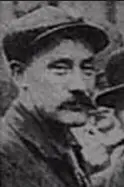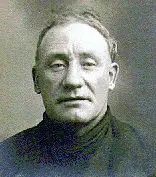Thomas Patrick Dillon
Engineering Crew, Trimmer

“He thought the First officer, Mr Murdoch, shot himself.”
According to Encyclopedia Titanica "Mr Thomas Patrick Dillon, 34, was born in Liverpool on 18th March 1878. When he signed-on to the Titanic, on 6 April 1912, he gave his address as the Sailors' Home, (Southampton). His last ship had been the Oceanic. As a Trimmer he received monthly wages of £5 10s. He said he was in the water - on the ship's deck directly prior to jumping with Denny Corcoran, Greaser: John Bannon and a man called Mason (no first name indicated). The only survivor of this small party was Dillon himself, the others died." (8.)
His report regarding Murdoch was made after his return to England, once the Lapland had docked in Plymouth. According to The Western Daily Mercury:
""One of the chief facts brought to light is that mr Murdoch, the Chief Officer, after working assiduously at getting the omwne and children into the boats, and launching them, killed himself...[Trimmer Thomas Dillon] saw the captain jump into the water... He thought the First officer, Mr Murdoch, shot himself."

It seems reasonably well established that Dillon indeed did stay on Titanic until the very end, later being picked up by lifeboat no.4. According to Michael Davie in his book The Titanic, The Full Story Of A Tragedy (1987):
""The drunk (pulled into lifeboat no.4) was a fireman from Belfast, Paddy Dillon, and he was the luckiest man of the night. He found the brandy somewhere, rapidly became drunk, toppled over the Titanic's side, and was immediately picked up."
Dillon later testified at the British Inquiry but made no mention of either the captain jumping or the Murdoch suicide. He did remain on boartd the ship until the end so it is feasible to have observed these events. However it seems he spent most of his time in the poop deck area and so would not have been in an ideal position to view what was happening. If he was indeed drunk, this would also make the observation unreliable.
According to The Leader, 21 April 2011 "Mr Dillon lived until 1939 when he died suddenly, being buried in his native Liverpool."
Verdict: